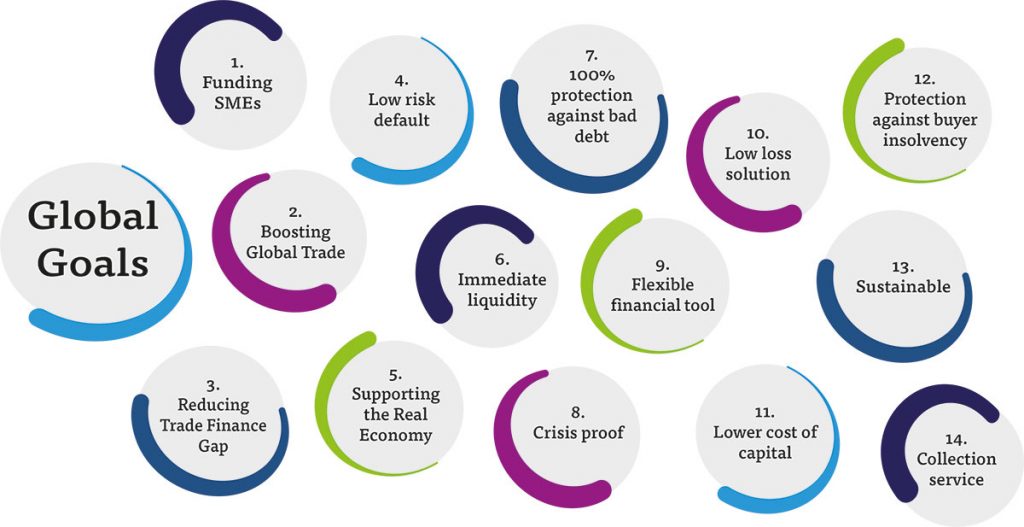FCI: Factoring Has the Wind in Its Sails — and a Long and Successful History Behind It
There is nothing complex about factoring. It is simply a unique blend of services designed to ease the traditional problems of selling on open account terms.

Factoring for institutions
Factoring is based on the idea of selling or assigning a business’s outstanding receivables (sales invoices) to the factor and receiving a set of trade-related services. These typically include investigating the creditworthiness of buyers, assuming credit risk, giving 100 percent credit protection against debtor write-offs, providing collection and management of receivables and provision of finance through immediate cash advances against outstanding eligible receivables.
Factoring: Suitable for SMEs?
Traditionally, a factoring company provides liquidity to an SME based on the eligible receivables assigned to it. The factoring company may offer a form of credit protection against the default risk of the client’s customers as well, providing additional capital to end-buyers, many of which are also SMEs. Ultimately these companies offer liquidity in the supply chain that normally would unavailable otherwise, mainly aimed at SMEs. The controls that factoring affords allow financial institutions to finance further into the supply chain, offering debt capital.
Factoring: a low loss History?
The factoring industry has enjoyed a long history with a low record of credit losses and continuous stable growth. As an alternative form of traditional trade finance, factoring is one of the few mechanisms within the wider financial services industry which allows a financial institution to purchase the assets from an SME client. In this case, that includes the account receivables and all of their underlying rights, and the right of collection of payment from the debtor/customer. This element strengthens the likelihood that the factor will be repaid as the source is the client’s customers, who typically are much stronger.
The receivables assigned to the factoring company are generally diversified and of short-term duration (normally less than a 90-day period). In addition, the financing provided to the seller is contracted on a flexible basis, often providing leeway for the factoring company to exit quickly in a deteriorating financial condition scenario. That is true whether it stems from the debtor or the seller, which in part explains the low loss record for the industry (EUF White Paper 2019).
Factoring companies also use strong credit metrics to protect against commercial default or insolvency. They become secure from the assignment of the receivable from the client and from the intricate management system of alerts in case of fraud, dilution, or concentration risk.
An explosive Rise in Factoring
Over the past two decades, factoring has increased nearly six-fold, from €500bn to nearly €3tn, a nine percent CAGR. But the largest growth spurt took place during the financial crisis in 2009, when the factoring community took up the slack as banks pulled out of financing arrangements.
Looking back at past recessions, factoring has a strong record of accelerated growth, due to SMEs looking for alternative forms of financing against receivables. It also stemmed from a need for credit protection against debtor default or insolvency, and the ability to obtain funding as sales increased.
Fast-forward to today, as the Covid-19 crisis impacts most economies, and there is another significant opportunity for the industry. Factoring will be in high demand during — and after — the crisis. Companies will seek alternative funding sources and try to mitigate the risk of receivables. Even with the predicted rise in bankruptcies and the many unknowns, there is likely to be a surge in volume next year.
That doesn’t mean that the community shouldn’t prepare for a challenging period ahead; the industry should return to basics, focusing on maximising risk controls.
Why do factoring companies join FCI?
FCI acts as a trade association supporting the growth of receivables finance around the world. It offers its members a platform to conduct cross border factoring in a secure manner. A proprietary communication system called edifactoring.com is a sound and secure means for members to issue factor guarantees, send invoice data, issue dispute notices, and provide payment advice.
FCI recently announced FCIreverse, a global supply chain finance (SCF) initiative, giving members access to a global platform to on-board anchor buyers and provide early payment to global suppliers. It is a place to network, where senior executives meet annually to exchange views and ideas.
In addition, FCI is a rule-making body for the open-account receivables finance industry, and has been for over 50 years. The General Rules of International Factoring (GRIF) is the legal basis for nearly all cross border business transactions, and the legal framework has been accepted by almost every major factoring company. FCI Academy provides e-learning courses, regional seminars, a degree programme in international factoring, consultancy advice, and operational guidance. FCI offers a robust education platform, accentuated by innovative marketing and promotion, and led by an engaged and dynamic secretariat based in the Netherlands.
Conclusion
Factoring is a straightforward and quite simple form of financing based on a receivable/invoice originated by the SME and directly linked to the real economy. Factoring has proven to be a go-to alternative to classic bank lending and has helped to alleviate much of the burden caused by the recent credit crunch, especially for SMEs.
Factoring is considered a low-risk form of financing, thanks to its direct connection to the real economy via the purchase or transfer of receivables for delivered goods and rendered services. It will be in high demand as banks pull out of credit facilities and companies look for new funding sources.
With the significantly increased risk environment, companies will seek to mitigate the risk of receivables. However, this asset class will be tested as never before; its secure nature and the controls that factoring affords will make it more attractive.
And for those using history as a milestone, factoring certainly has the winds in its sails.
You may have an interest in also reading…
stc: High Ideals, and a Series of Firsts for Kuwait
Kuwait Telecommunications Company (stc) believes the pandemic highlighted the importance and necessity of a strong telecom infrastructure. “People were eager
Sean Thompson, CAMRADATA: Future-proofing with Understanding, Honesty, Transparency … and Fun!
CFI.co engages in conversation with Sean Thompson, managing director of London-based asset manager research platform CAMRADATA. CFI.co: What are your
Strategy, Structure, Shared Purpose: There are Rules to Protecting Family Wealth
Bedrock Group partner Maurice Ephrati outlines his philosophy for family governance and next-generational financial education. The key ingredients for successful


















































































